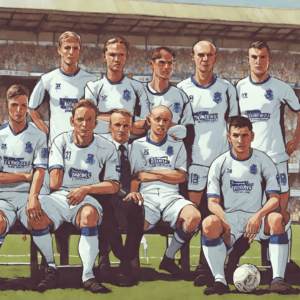Dementia Diagnosis: Former Wales forward Andrew Coombs bravely opens up
Andrew Coombs, a former Wales international rugby player, has recently made the brave decision to publicly share his dementia diagnosis. In a heartfelt statement, Coombs disclosed that he has been living with this neurocognitive disorder, shedding light on the challenges and struggles faced by athletes in later life.
Early Signs and Diagnosis
The journey towards Coombs’ diagnosis began when he started experiencing memory lapses and increasing difficulty with daily tasks. Concerned about these changes, he sought medical advice, leading to a series of assessments and tests. After careful evaluation, Coombs was given the life-altering diagnosis of dementia.
Shifting Perspectives on Sports-related Dementia
Coombs’ story adds to the growing conversation around the link between contact sports, such as rugby, and increased risk of developing dementia later in life. With several high-profile cases surfacing in recent years, the sporting community has been forced to confront the long-term consequences of head injuries and repeated concussions.
The Importance of Awareness and Support
Coombs’ decision to share his diagnosis highlights the importance of raising awareness about dementia and providing support for individuals living with the condition. By speaking openly about his experiences, he aims to break down the stigma associated with dementia and encourage conversations about the potential risks of contact sports.
The Impact on Daily Life
Dementia can have a profound impact on the daily lives of those affected. Individuals may experience memory loss, cognitive decline, mood changes, and difficulty performing routine tasks. Coombs’ openness about his struggles helps shed light on the challenges faced by dementia patients and their loved ones.
Athlete Well-being and Long-term Health
The implications of sports-related dementia extend beyond individual athletes. Coombs’ revelation prompts a deeper examination of the duty of care within sports organizations, emphasizing the need for comprehensive health screenings, post-career support, and ongoing research into the potential long-term effects of participating in contact sports.
The Role of Research and Advocacy
As Coombs continues to navigate life with dementia, he recognizes the importance of research and advocacy in driving understanding, prevention, and treatment for individuals affected by the disease. By sharing his story, he hopes to contribute to the growing body of knowledge surrounding dementia and ultimately improve the lives of those living with this condition.
Conclusion
Andrew Coombs’ decision to openly discuss his dementia diagnosis is a significant step towards raising awareness about the potential risks associated with contact sports and the impact of dementia on athletes’ long-term health. In sharing his experiences, Coombs encourages dialogue, research, and support for those living with dementia, reminding us of the importance of compassion and understanding for individuals facing this challenging journey.
Will Smith Provides Exciting Update on I Am Legend 2 Michael B Jordan

